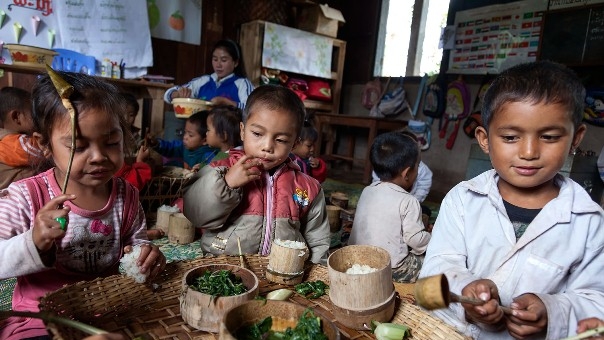Challenge
Developing countries have dramatically expanded access to preschool provision in the past decade, with all regions of the world increasing pre-primary enrollment. Yet, today, millions of young children below the age of 5 in low- and middle-income countries fail to reach their developmental potential, because they suffer from the negative consequences of poverty, nutritional deficiencies, and inadequate early learning opportunities.
Children develop rapidly during their early years and positive or negative experiences have implications for children’s well-being, school readiness, and later success in life.
- ECD links the young child’s cognitive, social, emotional, and physical processes with the care and services (provided by families, communities, and the nation) required to support their growth and development.
- Poverty and nutritional deficiencies are among the leading reasons that left 165 million children with stunted growth in the developing world, which compromised their physical capabilities and cognitive development to reach their full potential in life.
- From an education perspective, early gaps in cognitive skills jeopardize a child’s capacity and motivation to learn upon primary school entry. Low levels of school readiness can lead to costly inefficiencies in the education system as these children are more likely to have poor academic performance, repeat grades, and drop out of school before they complete the primary cycle. This reality is particularly likely for disadvantaged children.
Solution
In response to the convincing evidence on the benefits of investing in young children as well as demand from client countries, the Bank is increasingly supporting ECD around the world. It does so through financing, policy advice, technical support, and partnership activities at the country, regional, and global levels. ECD features prominently within the Bank’s Education Strategy 2020, which sets the goal of Learning for All through three pillars: Invest Early, Invest Smartly, Invest for All. ECD is also a strong component of the Bank’s health and nutrition, and social protection strategies.
The Bank uses a range of entry points to influence young children’s development and involves multiple stakeholders. They include investments in health care, hygiene, nutrition, and parental training to promote a child’s physical, cognitive, linguistic, and socio-emotional development. Programs can target the pregnant woman, the child, the caregiver, or the family as a whole and can take place in many environments, including the home, at a preschool or child care center, a health facility, or community center.
